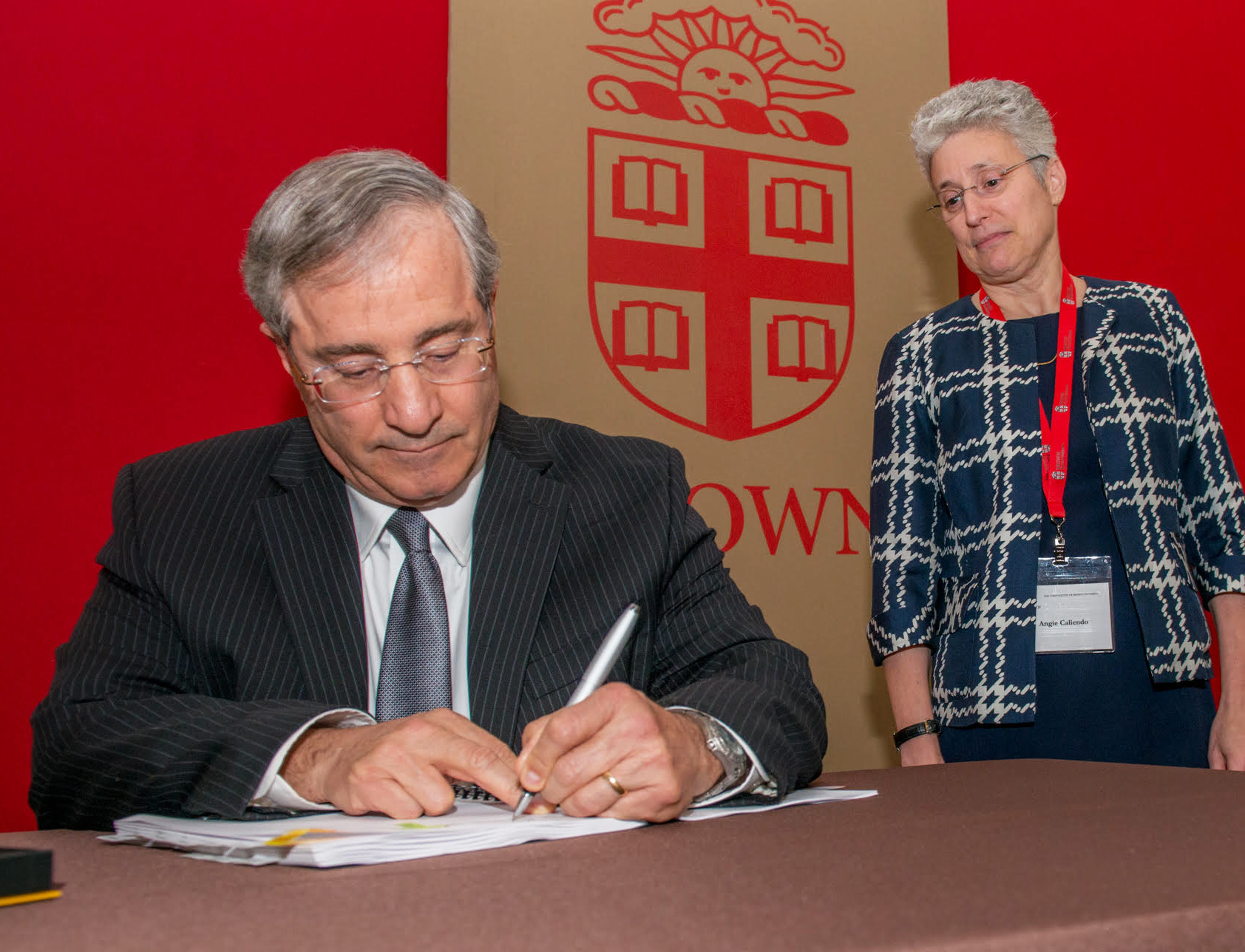New large group practice, Brown Physicians, Inc., created
Nonprofit federation created by Brown University and Warren Alpert Medical School will employ more than 500 physicians
More than arguing about the best way to eliminate car taxes or to launch a tuition-fee college plan for Rhode Island high school students, the most urgent crisis confronting Rhode Island is the potential loss of health care dollars under the Trump budget. Republican leaders in the R.I. General Assembly who said they didn’t have time to read Trump’s budget are being disingenuous at best. Who will step up to be the adult in the room?
PROVIDENCE – In a tumultuous time of great upheaval for health systems and hospitals in Rhode Island, Brown University has circled the wagons and created Brown Physicians, Inc., a federation of six physician group practices employing more than 500 physicians, in partnership with the Warren Alpert Medical School.
A formal agreement was scheduled to be signed today by members of the Corporation of Brown University and the presidents of the six physician groups: Neurology Foundation, Inc.; University Emergency Medicine Foundation; University Medicine Foundation; University Surgical Associates, Inc.; Brown Urology; and Brown Dermatology, Inc.
The new nonprofit Brown Physicians, Inc., partnership, which will officially take effect on July 1, 2017, followed 15 months of negotiations to reach an agreement, according to Brown officials.
“We believe that collaborating with our clinical partners to more tightly integrate patient care, research and education will result in a significant and positive impact on the local community,” said Brown University President Christina Paxson, in the embargoed news release.
Both Brown University and the Warren Alpert Medical School will be making a “significant” investment, according to Dr. Jack Elias, senior vice president of Health Affairs and dean of Medicine and Biologic Sciences at Brown, in an embargoed interview with ConvergenceRI in advance of the signing ceremony.
But, Elias continued, “It’s not all a matter of money.”
Brown Physicians is an example of Brown University investing in the clinical faculty to teach and conduct research, two of the cardinal missions at Warren Alpert Medical School, according to Elias.
“In these tumultuous times,” Elias said, in response to a question of the looming federal cuts in scientific research and health care spending, “I believe that Brown has to step up to the plate to support [and invest in] its clinical faculty.”
Translational research
The new Brown Physicians federation positions the medical school to increase its efforts to invest in collaborative translational research, attempting to speed the transition from laboratory bench research to clinical applications at the bedside.
Elias has undertaken a number of initiatives to support investments in translational research, including the Biomedical Innovation Fund at Brown University, which recently announced its first two $100,000 grants to accelerate the commercialization of technologies – one for diagnosing drug dependence in newborns and a second for the potential discovery of anti-ALS medicines. [See link to ConvergenceRI story, “Shining a bright light on extraordinary research talent in RI,” below.]
In February, the first two of six collaborative research awards for pilot projects planned for 2017 were announced as part of the five-year, $19.5 million Institutional Development Award from the National Institute of General Medical Sciences, a division of the National Institutes of Health. [See link to ConvergenceRI story, “And the winner is: Rhode Island and its innovation ecosystem.]
The new research program, known as the Advance-Clinical and Translational Research program, or Advance-CTR, addressed what Dr. Jim Padbury, the principal investigator, called “an unmet need for clinical translational research” in Rhode Island.
Padbury’s colleague and collaborator in coordinating the Advance-CTR program is Edward Hawrot, the Alva O. Way University Professor of Medical Science, associate dean of Biology and Professor of Medical Science at Brown University, a key member of Elias’s leadership team.
Brown Physicians, Elias told ConvergenceRI, are “thought leaders” in translational research, a process he described as taking basic investigations, moving the discoveries of what is discovered in the laboratory and determining whether it is actually relevant to treatment of diseases in humans.
“It creates a lovely dynamic between physician scientists and physician clinicians to make a discovery quickly, and [to determine] quickly if it is relevant and then translate it into new clinical therapies,” Elias said.
Integrated care, population health
In creating Brown Physicians, linking up six different foundations into a single federation, Elias explained, the goal is to look to develop efficiencies in patient care and better integration of patient care.
One feature will be the management of population health analytics, Elias continued. “Population health plays an increasingly important role in health care delivery,” Elias said. It is too soon to say whether Brown Physicians will undertake to build its own system or partner with existing systems now in place, he continued Or, whether it will be a combination of both.
In the beginning, Elias anticipated that there would be an increase in hiring as Brown Physicians assumes its new role, but that as the system develops economies of scale, some of the need for those new hires would level out.
New platforms for care
Elias said it was still too early to discuss the potential for new health care platforms, such as an urgent care facility, that Brown Physicians might invest in.
“The organization is literally going to be formed on Thursday [the 25th],” Elias said. “We have not done as much as we could in terms of planning for the future. I would be surprised to see us going into urgent care.”
By bringing these six different groups together, which Elias likened to the federation of the 13 original American colonies, the potential was there to redefine integrated care approaches, he said.
“What I would not be at all surprised to see is that [a patient] would go for an appointment for urology and end up seeing their internist, their surgeon and get their skin checked, all at the same time,” Elias said.
Editor's Note: ConvergenceRI will be following up on this story in the coming weeks, asking questions about how this new physicians' group will change the current academci relationship that Brown has with other practices, as well as responses from other health systems in Rhode Island.







